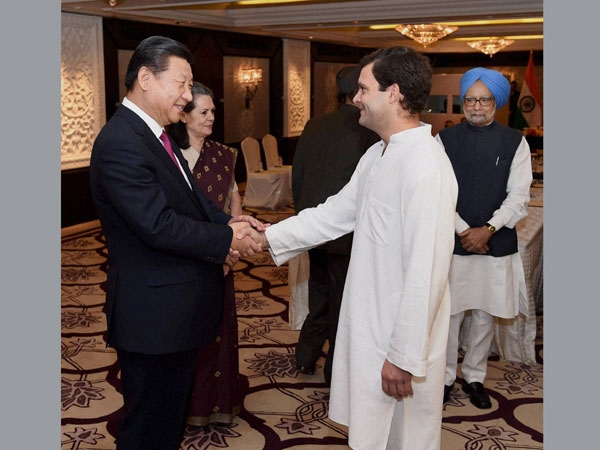Congress President Rahul Gandhi in his address in Delhi on Monday targeted PM Modi over the Doklam issue and claimed the Prime Minister bowed before China and handled the Doklam issue very poorly. He also accused PM Modi of keeping people in the dark over the Doklam standoff and compromising India’s national security. This absurd claim comes minutes after Rahul’s “Masood Azhar ji” comment.
Just 2 months before the Lok Sabha elections, Rahul Gandhi started his campaigns on baseless accusations against the Prime Minister. He claimed that Xi Jinping had sent a message to PM Modi that he was “a weak human” and was not in a position to “do anything”. Moreover, he stated, “PM Modi goes to China and holds meeting without any agenda. He bowed his head and folded his hands in front of China and said you keep Doklam, won’t tell anybody in India. I will handle things, you keep Doklam, won’t tell anybody in India. I will handle the press. End of talks. This is the reality of Narendra Modi ji”.
The Doklam standoff is regarded as one of the greatest diplomatic victories India has witnessed with China. Doklam is a disputed region lying between China and Bhutan and even after multiple attempts at negotiation, the issue hasn’t been resolved. The area is of strategic importance to India as it is in close proximity to the Siliguri corridor. Also called Chicken’s Neck, this corridor connects India’s mainland with its northeast region, surrounded by 3 countries and is a vulnerable point for India.
In June of 2017, China attempted to extend a road in the region, going southwards near Doka La pass, which led to a military standoff between India and China as India moved to prevent the construction. India acted on behalf of Bhutan, as both the countries share a special relationship, with India guiding Bhutan on foreign policy and defence affairs, making Bhutan a protected state of the country.
This led to an escalated issue between India and China as China claimed India had illegally trespassed into its territory. The Chinese government had stated, “India has no right to interfere in or impede the boundary talks between China and Bhutan.”
The two and a half month long military standoff ended after India took a strong stance against the Chinese incursion. The standoff was resolved after India demonstrated “diplomatic maturity without losing any ground.” In addition to the stare down on the military front, PM Modi also demonstrated clarity and tough stance on the diplomatic front through playing a masterstroke at the BRICS (involving Brazil, Russia, India, China and South Africa) summit, which acts as a gateway for China’s ambitions to become the global leader. China was all set to host the BRICS summit in the coastal city of Xiamen a week later which would have included a bilateral meeting between Xi Jinping and Narendra Modi. Had PM Modi boycotted the event, it would have meant the end of BRICS and that too at a time when China was urging to expand the BRICS and trying to integrate it with China’s ambitious Belt and Road initiative. This, subsequently, would have led to incessant ridicule of the Chinese President and adding to that, the all-important Congress of the Communist Party scheduled just after the summit had left Xi Jinping with no place to hide. Chinese imperative to host a successful summit in Xiamen provided the requisite push to end the face-off in Doklam. This was also an eye opener for the countries having border and maritime issues with China on how to deal with Beijing’s high-handedness.
Although Rahul Gandhi accused PM Modi of bowing before China, the reality cannot be further than this. It had emerged that it was Rahul Gandhi who had secretly met Chinese envoy to India, Luo Zhaohui, on July 8 amid escalated border tensions. After hours of denial, Rahul Gandhi eventually admitted, “It is my job to be informed on critical issues. I met the Chinese ambassador, ex-NSA, Congress leaders from NE & the Bhutanese ambassador.” However, when asked as to how he would have handled the situation, the Congress president replied, “I don’t have the details of Doklam so I can’t answer how I would have handled it differently.”
Interestingly, Rahul is a member of the parliamentary committee on external affairs which had examined the various aspects of the India-China military standoff at Doklam. This proves his “informed meeting” did not yield much benefits and one can only speculate over what important matter had to be discussed with China in such a hostile situation, so as to undermine Indian interests.
By every account, India led by PM Modi kept a very firm stand on Doklam and refused to budge despite the immense Chinese pressure. It was a victory after 13 rounds of negotiations done through established diplomatic channels. The standoff was the worst one seen in decades with China and PM Modi’s masterful diplomacy not only avoided a military conflict but also restored the status quo of the road, maintaining India’s defensive strategy.
